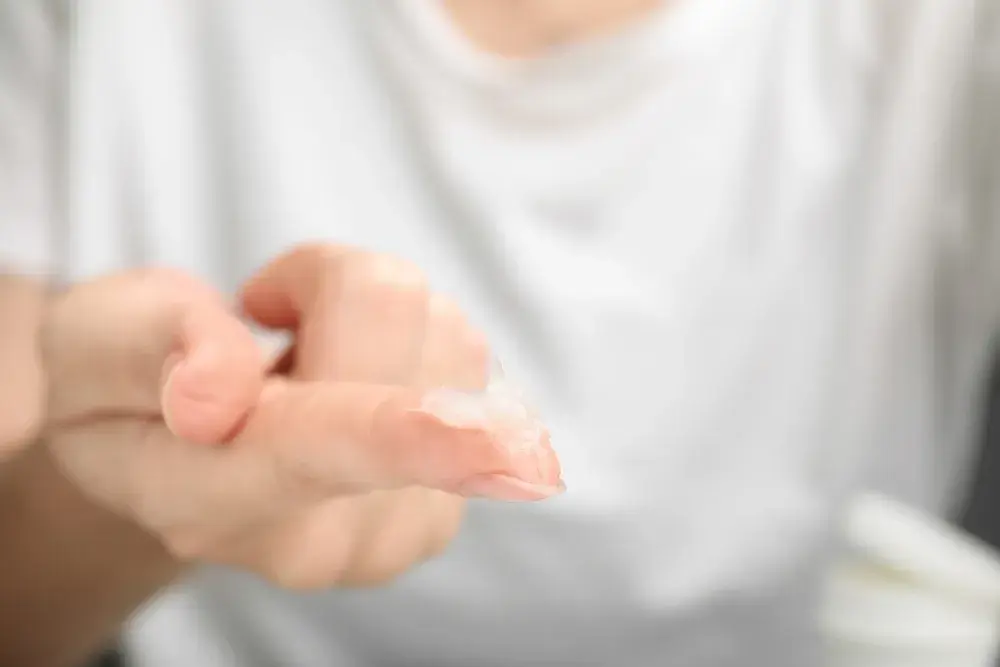What is Petrolatum?
Petrolatum, or petroleum jelly, is a byproduct of petroleum oil (crude oil). Because crude oil contains various chemical components, metals, and organic and inorganic materials, it must undergo a rigorous refining process to separate the petrolatum you can find in skincare products.
Petrolatum is most commonly referred to as a moisturizer, but it's specifically an occlusive. Occlusives are oil-based moisturizers that help the skin retain its water content by forming a water-repellent barrier that prevents moisture loss.
Petrolatum is one of the most effective and accessible moisturizers. The American Academy of Dermatology (AAD) recommends it for moisturizing dry, cracked skin and helping to protect healing wounds.
What are the uses of Petrolatum?
You can find a jar of petrolatum ointment in nearly every medicine cabinet for a reason. It's affordable, effective and multipurpose. But what is petrolatum used for, exactly?
Treat and prevent dry skin
As an occlusive moisturizer, petrolatum when used as an active ingredient is often used to help treat and help prevent dry skin. When you apply it to your skin, it forms a water-repellent barrier that helps prevents moisture loss. This is particularly helpful if you're dealing with extreme dryness, such as cracked heels, chapped lips or chafing.
Protect damaged and wounded skin
While most people love petrolatum for its moisturizing properties, it's also a U.S. Food and Drug Administration (FDA)-approved skin protectant in concentrations of 30% to 100%. This means you can use petrolatum to protect sensitive skin and support skin healing from minor injuries like cuts, scrapes or burns. You can use it on its own or in healing ointments and post-procedure creams to keep wounds moist.
Remove eye makeup
One of the best ways to use petrolatum in your skincare routine is as an eye makeup remover. Eye makeup can be especially stubborn and difficult to remove, as the skin around your eyes is thin and extra sensitive. Since petrolatum is oil-based and safe to use around your eyes, it's perfect for the job.
Moisturize nails and cuticles
If you love a good manicure, applying petrolatum between salon visits is a great way to rehydrate your nails. Its ability to seal in moisture can help hydrate cuticles, strengthen brittle nails and prevent chipping.
Boost haircare
You may not have considered petrolatum for haircare, but its moisturizing and protective qualities make it a great product to add to your stash. You can apply petrolatum to split ends to help reduce their appearance or throughout your hair for added shine.
If you dye your hair at home, applying petrolatum to your hairline can also help prevent hair dye stains on your skin.
Where does Petrolatum come from?
While it may not have come neatly packaged like today's petroleum jelly, petrolatum has been around for over a century. In the late 1800s, American chemist Robert Chesebrough noticed workers applying a waxy black substance from oil drills on their wounds during an oil well site visit. Struck by its healing properties, he refined this substance to make a light gel, marketing it as "Wonder Jelly." Since its introduction, petrolatum has been a staple for cosmetic and medicinal purposes.
So, is petrolatum safe? Today, petrolatum must undergo a strict purification process to make it safe for use in skincare. First, manufacturers distill crude oil through high temperatures to remove unwanted gases. They then extract heavier oils and finally remove any other chemical components through dewaxing.
Strict regulatory guidelines ensure safety at each step of the purification process. In the United States, the FDA regulates everything from the manufacturing facility to the processing. The European Union requires a full refining history for petrolatum in cosmetics.
How to incorporate Petrolatum into your skincare routine
Regardless of your skin type or current routine, if you're interested in reaping the benefits of petrolatum, you have options.
Try an overnight treatment
Start by adding a petrolatum-based product to your nighttime skincare routine. Remember, petrolatum is occlusive, which means it seals in moisture. Applying a night cream or lip treatment with petrolatum is a great way to lock in moisture overnight. Try Neutrogena® Hydro Boost Hydrating Lip Sleeping Mask to wake up to smoother, softer, more supple lips.
Protect your skin from head to toe
Your face probably gets the most attention in your skincare routine and for good reason. But remember to give other parts of your body some love, too. Try Neutrogena® Hydro Boost Whipped Body Balm to replenish dry skin with a velvety, non-greasy formula.
For dry, cracked hands, opt for a nourishing hand cream. Neutrogena® Hydro Boost Hand Gel Cream draws water to the skin with hyaluronic acid and seals it in with petrolatum for the ultimate in hand care.
Target concern areas
If your core skincare routine is set, you can always add petrolatum as a supplementary product for problem areas. Use it on sensitive areas, like cuticles or under the eyes, to put a little more TLC into your personal care routine.





